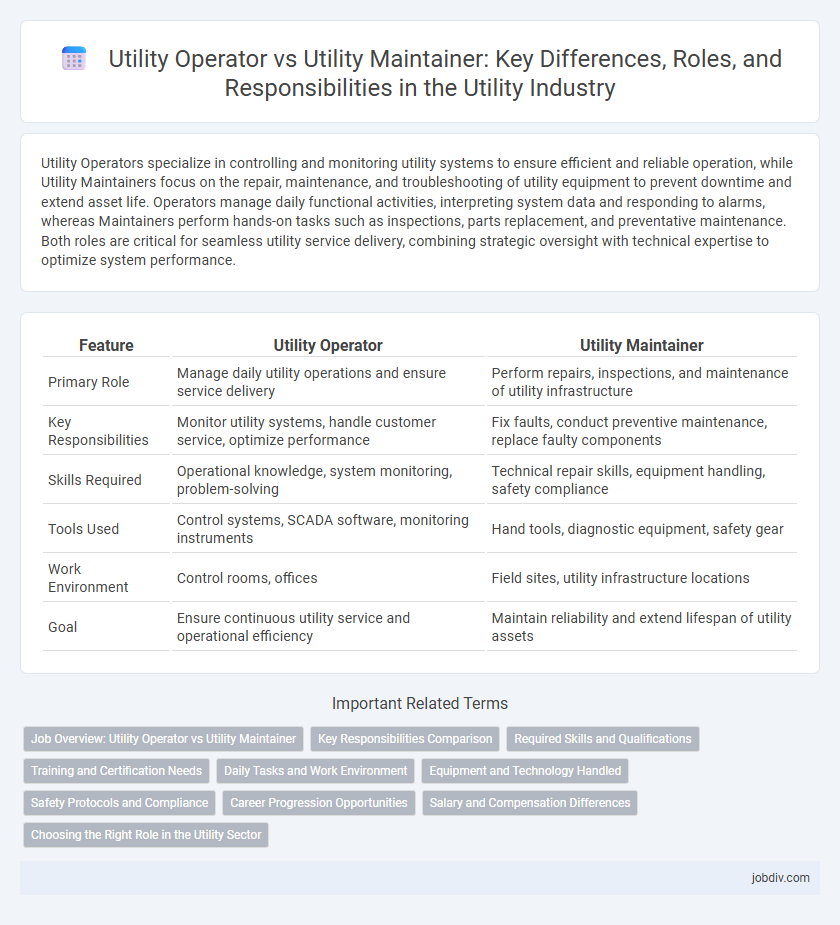Utility Operators specialize in controlling and monitoring utility systems to ensure efficient and reliable operation, while Utility Maintainers focus on the repair, maintenance, and troubleshooting of utility equipment to prevent downtime and extend asset life. Operators manage daily functional activities, interpreting system data and responding to alarms, whereas Maintainers perform hands-on tasks such as inspections, parts replacement, and preventative maintenance. Both roles are critical for seamless utility service delivery, combining strategic oversight with technical expertise to optimize system performance.
Table of Comparison
| Feature | Utility Operator | Utility Maintainer |
|---|---|---|
| Primary Role | Manage daily utility operations and ensure service delivery | Perform repairs, inspections, and maintenance of utility infrastructure |
| Key Responsibilities | Monitor utility systems, handle customer service, optimize performance | Fix faults, conduct preventive maintenance, replace faulty components |
| Skills Required | Operational knowledge, system monitoring, problem-solving | Technical repair skills, equipment handling, safety compliance |
| Tools Used | Control systems, SCADA software, monitoring instruments | Hand tools, diagnostic equipment, safety gear |
| Work Environment | Control rooms, offices | Field sites, utility infrastructure locations |
| Goal | Ensure continuous utility service and operational efficiency | Maintain reliability and extend lifespan of utility assets |
Job Overview: Utility Operator vs Utility Maintainer
Utility Operators control and monitor equipment that distributes services such as water, gas, or electricity, ensuring efficient and safe delivery. Utility Maintainers perform routine inspections, repairs, and preventive maintenance on infrastructure and machinery to prevent service interruptions and extend equipment lifespan. Both roles are critical for uninterrupted utility service, with operators focusing on real-time system management and maintainers emphasizing upkeep and fault resolution.
Key Responsibilities Comparison
Utility operators are responsible for controlling and managing the operation of utility systems such as water, gas, or electricity, ensuring continuous and safe service delivery. Utility maintainers focus on the inspection, repair, and upkeep of physical infrastructure and equipment to prevent system failures and prolong asset lifespan. The key responsibilities of operators revolve around system monitoring and control, while maintainers prioritize troubleshooting and maintenance tasks to support reliable utility operations.
Required Skills and Qualifications
Utility operators require strong technical knowledge of system controls, equipment operation, and safety protocols, often holding certifications in electrical or mechanical fields and experience in monitoring utility systems. Utility maintainers need advanced problem-solving skills, proficiency in diagnostics and repairs, and expertise in maintaining infrastructure such as pipelines, electrical grids, or water systems, typically supported by vocational training or technical degrees. Both roles demand physical stamina, attention to detail, and adherence to safety regulations, but maintainers prioritize hands-on repair skills while operators focus on real-time system management.
Training and Certification Needs
Utility operators require extensive training in system control, safety protocols, and emergency response to ensure efficient and secure energy distribution. Utility maintainers must obtain specialized certifications in equipment maintenance, troubleshooting, and repair techniques to uphold infrastructure reliability. Both roles demand continuous education to stay updated on industry regulations and emerging technologies.
Daily Tasks and Work Environment
Utility operators monitor and control essential service systems such as water, gas, or electricity, ensuring efficient distribution and responding promptly to system alerts. Utility maintainers perform hands-on repairs, routine inspections, and preventive maintenance to keep infrastructure like pipelines and electrical grids functioning safely and reliably. Operators typically work in control rooms with advanced monitoring technology, while maintainers frequently operate in field environments exposed to physical and environmental challenges.
Equipment and Technology Handled
Utility operators primarily manage and control equipment such as pumps, valves, and control panels to ensure continuous utility services, often utilizing advanced process control systems and SCADA technology. Utility maintainers specialize in the repair, installation, and preventive maintenance of utility infrastructure, including electrical wiring, motors, generators, and HVAC systems, using diagnostic tools and condition monitoring technologies. Both roles require expertise in utility management software and familiarity with safety protocols related to complex mechanical and electrical equipment.
Safety Protocols and Compliance
Utility operators must strictly adhere to safety protocols and regulatory compliance to ensure the integrity of utility services and prevent accidents. Utility maintainers focus on executing maintenance tasks while following established safety guidelines to minimize risks during repairs and inspections. Both roles require continuous training on compliance standards to uphold operational safety and protect workers and the public.
Career Progression Opportunities
Utility Operators typically focus on controlling and monitoring equipment, gaining foundational skills essential for system reliability, while Utility Maintainers are responsible for troubleshooting and repairing infrastructure, requiring advanced technical knowledge. Career progression often moves from Operator roles to Maintainer positions through certifications and hands-on experience, leading to higher wage potential and supervisory opportunities. Professionals who transition from Operator to Maintainer benefit from expanded responsibilities, contributing to improved system performance and career advancement within the utility sector.
Salary and Compensation Differences
Utility Operators typically earn a median annual salary ranging from $45,000 to $60,000, reflecting their role in controlling and monitoring utility systems. Utility Maintainers generally command higher compensation, often between $55,000 and $70,000 annually, due to their responsibilities involving repair, maintenance, and troubleshooting of utility infrastructure. Salary variations depend on factors such as geographic location, experience, and the complexity of the utility systems handled.
Choosing the Right Role in the Utility Sector
Utility operators specialize in controlling and monitoring utility systems to ensure efficient and safe service delivery, while utility maintainers focus on repairing and sustaining infrastructure to prevent outages and system failures. Choosing the right role depends on whether one prefers dynamic, real-time system management or hands-on technical maintenance and troubleshooting. Career growth in both positions requires understanding utility regulations, safety protocols, and emerging technologies in energy, water, or telecommunications sectors.
Utility Operator vs Utility Maintainer Infographic

 jobdiv.com
jobdiv.com